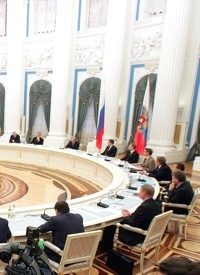
Once upon a time the United States had some standing to lecture communist countries on the virtues of free markets. Today, however, our government is growing larger by the minute, while Cuba and Russia — once the most communist of communist nations — are heading in the opposite direction, at least in economic terms.
“Cuban strongman emeritus Fidel Castro,” as The New American’s Warren Mass described him, recently told the Atlantic’s Jeffrey Goldberg that “the Cuban model doesn’t even work for us anymore” — a statement that Goldberg’s friend Julia Sweig, who was present at the time, interpreted as “an acknowledgment that under ‘the Cuban model’ the state has much too big a role in the economic life of the country.” (Castro later claimed, not very convincingly, that he meant exactly the opposite of what he had said.) Though the island nation remains officially communist and its government is still quite repressive, Raul Castro, Fidel’s brother, who is now the titular head of the country, has taken steps to loosen the government’s grip on the economy. For example, the government is going to lay off over a million workers, with half of them to be gone by March, according to the BBC, which observed: “To create jobs for the redundant workers, strict rules limiting private enterprise will be relaxed and many more licenses will be issued for people to become self-employed.”
Raul Castro, sounding like nothing so much as a Tea Party candidate, explained these moves thus: “We have to end forever the notion that Cuba is the only country in the world where you can live without working.”
Meanwhile, in Russia (formerly the communist Soviet Union), under the leadership of two-time president, and now prime minister, Vladimir Putin (himself an ex-KGB agent), has also moved in the direction of greater economic freedom and smaller government even as the U.S. government has piled regulations and taxes on its own country’s businesses. Back during his first presidential term, Putin introduced a flat income tax with a rate of 13 percent, cut the corporate tax rate, and improved tax conditions for small businesses, to the point that, says Wikipedia, the “overall tax burden is lower in Russia than in most European countries.”
Today, writes Terrence Aym at Helium.com, “Putin is rebuilding the house of Russia while the US administration and Congress is [sic] building a house of cards.” For instance, Aym says that Putin “has vowed to cut his government’s bureaucracy by 5 percent this year and 20 percent by 2013. A whopping 174,000 government workers are slated to get the axe. Yet back in the sinking US, according to the prestigious Goldwater Institute, the U.S. federal health care bill creates somewhere between 47 to 160 new agencies and offices. Maybe. The actual number is unknowable according to the apolitical Congressional Research Service.” Aym might have added that government employment in general is on the rise in the United States, and President Obama signed legislation in August to keep another 300,000 state and local government workers on the payroll for another year. ObamaCare only makes the situation much, much worse.
“Putin is demanding that parliament lift all the barriers to new business start-ups and swiftly eliminate the Gordian knots of excessive State regulatory controls,” Aym writes. He is also, Aym says, “steering Russia towards an economic climate that echoes the US environment during the early 1980s: deregulation. ‘The institution of oversight and control has lost its value,’ Putin explained.” (That assumes it ever had value in the first place, but let’s give Putin credit for coming late to the deregulation party rather than never arriving at all.)
The results of Putin’s policies, according to Aym, are that “Russia’s debt as a percentage of GDP is shrinking as the USA’s is steadily climbing” and that “Russia has emerged from its recession” while “US policy continues to drive the nation towards higher unemployment and a full blown depression” as our government “beefs up its command and control structure while preparing to micromanage the economy in a remarkable Kafkaesque reprise of the old Soviet-style 5-year plans.”
No one would mistake Fidel Castro, Raul Castro, or Vladimir Putin for Thomas Jefferson; they remain authoritarians whose primary concern is retaining power. Nevertheless, they seem to have a firmer hold on economic reality than most American political leaders, who continue to go merrily on their way as if the U.S. government and economy are not teetering on the edge of a precipice. Who would ever have thought the day would come when Washington could take economics lessons from Havana and Moscow?
Photo: Russian President Vladimir Putin with ministers and the heads of major Russian companies in the Kremlin in Moscow, Feb. 6, 2007: AP Images



